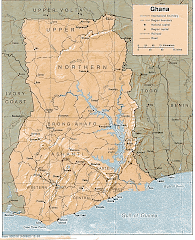Hot Water: a simple concept of course, you take cold water and apply heat.
The baby was premature at birth 2 weeks ago but had grown and the midwives discharged the infant last Sunday weighing about 5lbs 6 oz with instructions to come back to the hospital (a walking distance away) if anything should happen. By the time “something had happened” on the morning on Wednesday and the parents had worked their way through the long lines and had been seen by a medical assistant and had been identified, had worked through the lab and had gotten to the ward, it was 5PM and we were at the door to leave.
He was small frail, cold, blue and gasping. His heart rate was fast and thready. I examined him and as well as I could tell, he had no pneumonia, abdominal catastrophe, trauma or “localizing sign.” He was just dying. Back home we would probably talk roundly of “late neonatal bacterial sepsis” would get labs as appropriate, would start an aggressive course of fluids, pressors, mechanical ventilators, steroids and antibiotics. He would be tubed and “lined” monitored and measured.
What we had was IV fluids, low flow oxygen and precious little faith. A spinal tap was done quickly, once the IV was “set,” antibiotics were given and I set about to see if we could reverse the inevitable. We pushed in saline to open up his collapsing blood supply but within minutes his faint breathing stopped and his heart rate fell to the sixties.
“We lost him.”
Despite all though, his gasping respirations continued and his heart rate lingered below a hundred. I was discouraged and fascinated; it is a peculiar thing that when an infant is dying, the heart continues to beat faithfully long after death is assured, long after all measures are made and failed and long after the staff are too discouraged and exhausted to notice. Even brief tortured breaths can be noted. So was it here. I gave orders to be called when he died and left at 8PM for a cold dinner of rice and beans. I circled around afterwards to talk with the staff and said how I had appreciated how they worked with the “baby who died.”
“Oh he is not dead yet.”
Humility is not a condition I cultivate but would learn something of it then.
He was still cold and pale but breathing easily with a good heart rate.
He still looked dead to me.
What more was there to do for my embarrassing patient?
“When all else fails, start at the beginning,” I was told once.
Vitals signs were ok now but this temperature? A quick check for the record; his temperature was 32.6C (about 92F); hardly above the room temperature. How were we to warm him? There is no incubator for him; no electronic gismo to make sure the temperature stays even. On the wards there is not even running water. The hospital has hot water, for washing surgical equipment, IV bottles and such, and it closes at night as does the lab.
He needed hot water bottles; a remedy of which my mother would have greatly approved. The pharmacy was at least a place to start. I called to the newly arrived volunteer, Chuck Holmes, and we started to conspire. Half-quart glass IV bottles would be water-proof with no leaking onto the bed, easily transported in cardboard boxes and insulated therein to boot. I acquired my first half-dozen bottles, filled three with hot tap water rather than the scalding distilled water from the still and carted over to paediatics the first batch. We tucked them into folds in the thin cotton “kanga” cloths which serve as bassinet, clothes and diaper for newborns; one on either side and one at the head (heat loss is largely from the head). He still looked dead and it took an exam to prove to me he was breathing and had a heart rate. I circled around, collected my next half-dozen bottles and headed back to “House 6” about a quarter mile away, with a mission.
Hot water in most African mission stations and indeed in most places I have stayed is provided by a “geyser” (pronounced “geezer” at least in central and east
Again surprisingly, our “Lazarus” gained temperature with each hour reaching normal in about 5 hours. Maintaining his temperature during our current hamartan (dust storm) was tricky, all the Ghanaians are complaining bitterly of the cold night weather, going down as it does to the hi 50’s in unheated mud wattle houses. Nevertheless, Lazarus was warm yawning and active by morning. We could even stop the bottles by this evening, as he was well enough to cuddle with mother instead.
We have just started trying to re-feed him by tube now; I have no idea whether it will be successful and what ever damage he might have sustained. I do know that anyone who says that serving is rural



2 comments:
Great story, Walt. Keep us posted.
Hardy
Good post.
Post a Comment